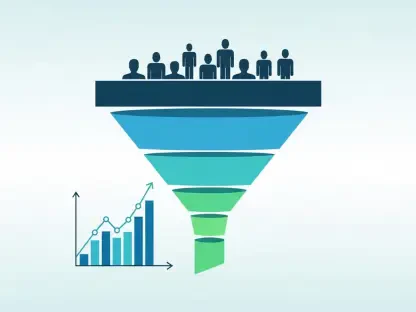In an era where digital noise is louder than ever, businesses are constantly seeking ways to stand out and forge meaningful connections with their audiences, and content marketing has emerged as a transformative strategy to achieve just that. Unlike the hard-sell tactics of traditional advertising, this approach prioritizes delivering valuable, relevant information that resonates with potential customers, building trust over time. It’s not about pushing a product but about pulling in an audience through compelling stories, actionable insights, and consistent engagement. As brands navigate the complexities of the online landscape, content marketing proves to be a cornerstone for sustainable growth, offering benefits that extend far beyond immediate sales. From enhancing visibility to fostering loyalty, this strategy addresses multiple facets of customer interaction, making it indispensable for modern businesses aiming to thrive in a competitive environment.
The Foundation of Digital Success
Content marketing stands as a critical pillar in the realm of digital strategy, seamlessly integrating with components like search engine optimization (SEO) and social media to amplify a brand’s reach. It serves as a catalyst for engagement by providing tailored information that meets customers at various points in their journey, whether they are exploring options or on the verge of a purchase decision. This adaptability ensures that businesses can address specific needs and pain points, creating a sense of relevance that generic ads often fail to achieve. Moreover, compared to traditional marketing methods, content marketing delivers a higher return on investment by generating leads at a fraction of the cost, making it an attractive option for companies of all sizes. Its ability to fuel other marketing channels while maintaining a focus on value creation positions it as a fundamental tool for long-term digital success, paving the way for deeper audience connections.
Beyond its integrative role, content marketing reshapes how businesses communicate by emphasizing authenticity over aggressive promotion. It builds a narrative that aligns with audience expectations, offering insights and solutions rather than mere sales pitches. This shift is crucial in an age where consumers are increasingly skeptical of overt advertising, often turning to ad blockers to avoid interruptions. By focusing on meaningful content, brands can bypass these barriers, establishing themselves as trusted resources rather than intrusive marketers. The result is a more engaged audience that actively seeks out information, whether through blog posts, videos, or social updates, fostering a relationship rooted in mutual benefit. This strategic focus not only enhances visibility but also lays the groundwork for sustained growth, as customers are more likely to return to a brand that consistently delivers value.
Boosting Visibility and Conversions
One of the most significant advantages of content marketing lies in its power to drive organic traffic to websites through well-crafted, SEO-optimized material. By creating content that aligns with search intent, businesses can secure higher rankings on search engine results pages, attracting visitors who are actively looking for solutions. This process is further enhanced by earning backlinks from authoritative sources, which signal credibility to search engines and amplify reach. Unlike paid advertisements that may generate temporary spikes in traffic, content marketing builds a steady stream of visitors over time, ensuring a consistent flow of potential leads. This focus on organic growth translates into a more sustainable approach to visibility, allowing brands to establish a strong online presence without relying solely on paid channels.
Equally important is how content marketing nurtures leads into conversions by addressing customer needs at every stage of the buying journey. From awareness to decision-making, thoughtfully designed content provides the right information at the right time, guiding prospects toward a purchase. This nurturing process stands in contrast to inorganic traffic sources, which might bring clicks but often fail to convert due to a lack of relevance. By prioritizing value-driven engagement, such as educational articles or insightful case studies, brands can build trust and credibility, making it easier to close sales. The outcome is a higher conversion rate, as customers feel understood and supported rather than pressured, highlighting content marketing’s dual strength in both attracting and converting audiences effectively.
Engaging Without Intrusion
In a digital landscape where interruptive ads often alienate consumers, content marketing offers a refreshing alternative by delivering value without annoyance. This strategy focuses on creating material that audiences actively seek out, whether it’s a helpful guide or an entertaining video, ensuring engagement feels natural rather than forced. Statistics reveal that this approach generates three times more leads than traditional marketing channels while costing significantly less, proving its efficiency. By avoiding the irritation associated with pop-ups or unsolicited promotions, brands can foster a positive perception that encourages long-term interaction. This non-intrusive method not only enhances the customer experience but also builds a foundation of goodwill that is hard to replicate with conventional advertising tactics.
Furthermore, content marketing’s ability to resonate with audiences lies in its emphasis on solving real problems and answering pressing questions. Instead of bombarding users with sales messages, it positions brands as helpful allies, offering insights that align with consumer interests. This creates a dynamic where customers willingly engage, often sharing content with their networks or returning for more information. Such organic interaction is invaluable, as it reflects genuine interest rather than coerced attention, leading to stronger loyalty over time. The contrast with traditional ads, which many view as disruptive, underscores why content marketing has become a preferred choice for businesses aiming to connect authentically in a crowded digital space, ensuring lasting impact.
Amplifying Reach and Identity
Content marketing plays a pivotal role in expanding a brand’s social media presence by encouraging organic engagement and sharing among followers. High-quality posts, whether informative articles or captivating visuals, naturally prompt audiences to interact, comment, and spread the word, thereby increasing visibility without additional advertising spend. This ripple effect amplifies reach far beyond initial audiences, tapping into new networks and potential customers through shared content. As followers grow, so does the opportunity to build a community around the brand, where regular updates and valuable insights keep engagement levels high. This social momentum is a testament to content marketing’s power in creating a self-sustaining cycle of interaction and growth across platforms.
Additionally, content marketing allows businesses to craft a distinct brand identity through storytelling that reflects their values and mission. Beyond logos or product offerings, it’s the narratives woven into blogs, videos, or campaigns that help a brand stand out in a competitive market. By showcasing personality—whether through humor, empathy, or a commitment to social causes—companies can forge emotional connections that resonate deeply with their audience. This approach transforms a brand from a faceless entity into a relatable partner, fostering a sense of belonging among customers. Such differentiation is crucial in building not just recognition but also loyalty, as audiences are drawn to brands that align with their own beliefs and aspirations, making content marketing an essential tool for identity development.
Streamlining Support and Accessibility
Another compelling benefit of content marketing is its capacity to enhance customer service by proactively addressing common inquiries through accessible resources. Detailed blogs, FAQs, or tutorial videos can answer routine questions, reducing the workload on support teams and allowing them to focus on more complex issues. This efficiency not only improves operational flow but also elevates the customer experience, as users can find solutions quickly without waiting for assistance. By serving as a first line of support, content marketing ensures that businesses maintain high satisfaction levels while optimizing resources, demonstrating its practical value in day-to-day operations beyond mere promotion or sales efforts.
Equally noteworthy is how content marketing accommodates diverse audience preferences by offering information in multiple formats, such as podcasts, infographics, and written articles. This versatility ensures that messages reach individuals regardless of their preferred learning style, making the brand more inclusive and accessible. Whether someone absorbs information best through audio content during a commute or visual summaries for quick reference, content marketing adapts to meet those needs without losing consistency in messaging. This adaptability broadens the potential audience base, ensuring no segment is overlooked, and reinforces the brand’s commitment to serving varied demographics. As a result, businesses can engage a wider range of customers, enhancing both reach and impact through a thoughtful, multifaceted approach.
Looking Back at Lasting Impact
Reflecting on the journey of content marketing, it’s evident that this strategy reshaped how businesses connected with audiences by prioritizing value over volume in their communications. Its ability to drive traffic, boost sales, and engage without intrusion marked a departure from the aggressive tactics of yesteryear, setting a new standard for customer interaction. The way it amplified social media presence and defined brand identities showed a deeper understanding of emotional resonance, while streamlining customer support and embracing diverse formats highlighted its versatility. Each facet contributed to a holistic approach that turned fleeting attention into sustained loyalty, proving its worth across industries. As the digital landscape continues to evolve, the lessons from content marketing’s past successes encourage businesses to keep innovating, focusing on authenticity and adaptability to meet future challenges with confidence.









